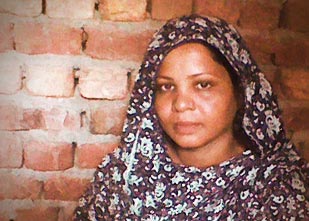HAIG TER-GHEVONDIAN WRITES – Pakistan’s flag is comprised of the colors green and white. The green represents the Muslim majority, while the white represents non-Muslim minorities. Together, they represent religious tolerance and unity – concepts on which the nation was founded. Such values are called into question, however, when cases like Asia Bibi’s continue to surface throughout the country.
Asia Bibi, a Christian Pakistani, was accused of the crime of blasphemy against the Prophet Mohammed in June 2009. In the fields where she worked, Asia offered water to her coworkers. They refused to drink from the bucket since it was “touched by a non-Muslim.” An argument ensued between Asia and her coworkers with word quickly reaching the town’s Muslim cleric.
The cleric reported Asia to the police and she was arrested. Fifteen months later, Asia was sentenced to death. This is the punishment set forth in article 295-C of the Pakistani Penal Code. “Tears poured from my eyes. It was the happiest day of my life” said the cleric in an interview with CNN in 2010.
Since the verdict, human rights organizations across the globe have made it their mission to spread word of Asia’s situation and petition for her freedom. Nevertheless, fear prevents Pakistanis in the country from speaking for Asia publicly.
In 2010, Pakistani minister Shahbaz Bhatti called for Asia’s release from prison due to lack of evidence against her. Months later, Bhatti was killed by the Taliban. A year later, Salam Taseer, the governor of Punjab, also urged for Asia’s release and was assassinated by his bodyguard, Mumtaz Qadri.
What made matters worse was instead of condemning the murderer, the media hailed Qadri as a hero.
Since the murder of both government officials, major Pakistani media outlets have reported less frequently about Asia’s case. Even so, people like Nabeel Chohan of Dawn News dare to continue writing about the case while explaining the mindset behind the conviction.
Chohan writes, “Women and minorities form the lowest segments of Pakistan’s society…Asia Bibi, therefore, is a soft target for Pakistan’s religious right that has now found influence in the country’s prominent military, judicial and parliamentary quarters.” Human Rights Watch reports that this influence has also prevented the government from protecting their non-Muslim citizens.
This lack of coverage sets a very dangerous precedent not just for Pakistan’s minorities, but for the nation itself. At the height of this identity crisis, Pakistan is faced with the most important question: What is its true moral identity?

